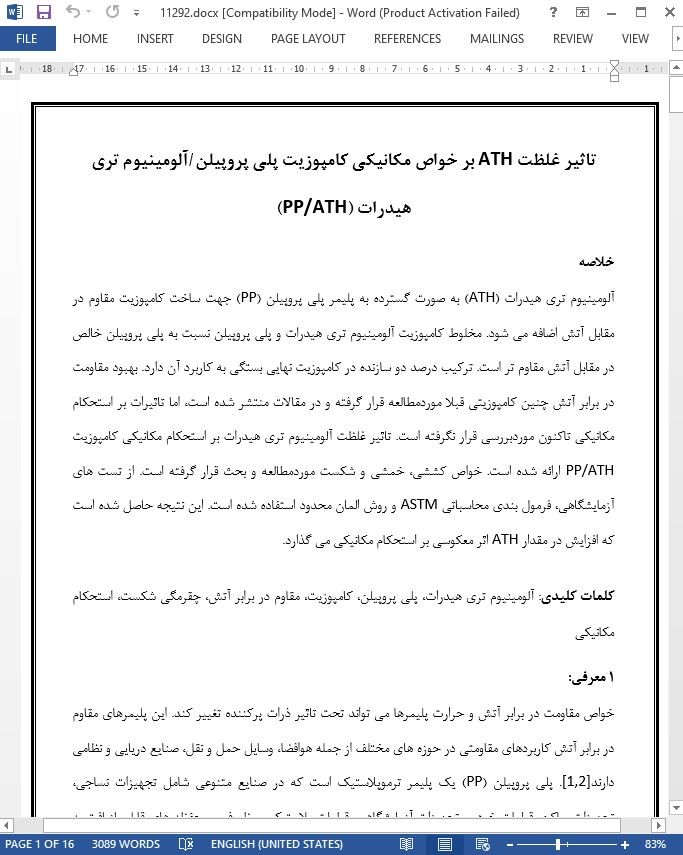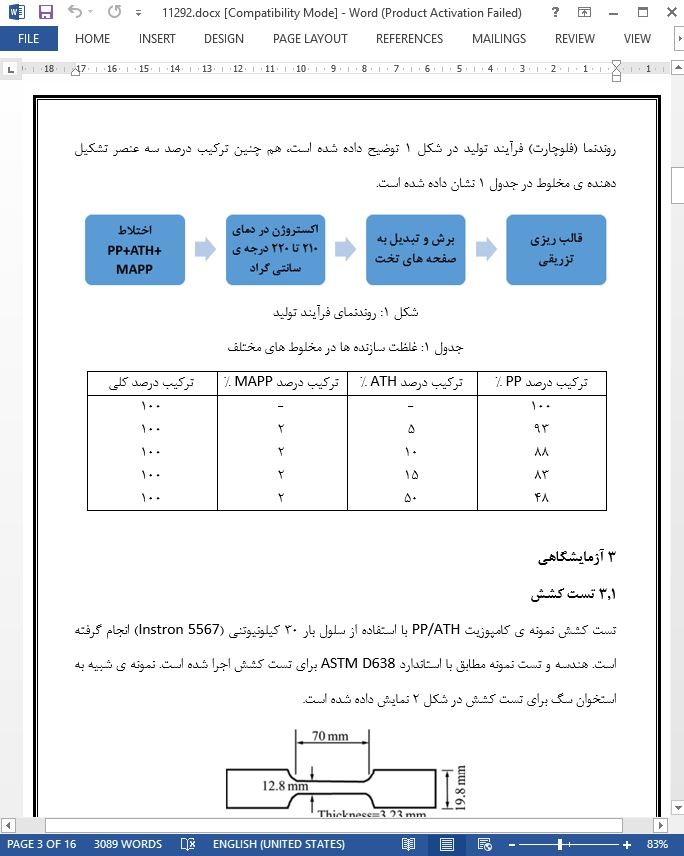
تاثیر غلظت ATH بر خواص مکانیکی کامپوزیت پلی پروپیلن/آلومینیوم تری هیدرات
خلاصه
آلومینیوم تری هیدرات (ATH) به صورت گسترده به پلیمر پلی پروپیلن (PP) جهت ساخت کامپوزیت مقاوم در مقابل آتش اضافه می شود. مخلوط کامپوزیت آلومینیوم تری هیدرات و پلی پروپیلن نسبت به پلی پروپیلن خالص در مقابل آتش مقاوم تر است. ترکیب درصد دو سازنده در کامپوزیت نهایی بستگی به کاربرد آن دارد. بهبود مقاومت در برابر آتش چنین کامپوزیتی قبلا موردمطالعه قرار گرفته و در مقالات منتشر شده است، اما تاثیرات بر استحکام مکانیکی تاکنون موردبررسی قرار نگرفته است. تاثیر غلظت آلومینیوم تری هیدرات بر استحکام مکانیکی کامپوزیت PP/ATH ارائه شده است. خواص کششی، خمشی و شکست موردمطالعه و بحث قرار گرفته است. از تست های آزمایشگاهی، فرمول بندی محاسباتی ASTM و روش المان محدود استفاده شده است. این نتیجه حاصل شده است که افزایش در مقدار ATH اثر معکوسی بر استحکام مکانیکی می گذارد.
1 معرفی
خواص مقاومت در برابر آتش و حرارت پلیمرها می تواند تحت تاثیر ذرات پرکننده تغییر کند. این پلیمرهای مقاوم در برابر آتش کاربردهای مقاومتی در حوزه های مختلف از جمله هوافضا، وسایل حمل و نقل، صنایع دریایی و نظامی دارند[1,2]. پلی پروپیلن (PP) یک پلیمر ترموپلاستیک است که در صنایع متنوعی شامل تجهیزات نساجی، تجهیزات ساکن، قطعات خودرو، تجهیزات آزمایشگاهی، قطعات پلاستیکی و ظروف و محفظه های قابل بازیافت به کار می رود[3] . به صورت رایج غلظت های متفاوت ATH بنابر کاربردهای متفاوت PP به منظور افزایش دمای شعله به آن اضافه می شود[4] . در حال حاضر خواص مقاومت حرارتی، مقاومت در برابر الکتریسیته و آتش مخلوط ATH با پلیمرهای مختلف از جمله PP در منابع منتشر شده است[4-12] ؛ در حالی که در مورد استحکام مکانیکی و چقرمگی شکست این کامپوزیت های پلیمری اطلاعات کافی در دسترس نیست.
7 نتیجه گیری
خواص مکانیکی شامل استحکام کششی، مدول الاستیک و استحکام خمشی کامپوزیت های مقاوم در برابر آتش PP/ATH با استفاده از تست های آزمایشگاهی استاندارد و چقرمگی شکست محاسبه شده از روش المان محدود و فرمول بندی استاندارد ASTM محاسبه شده اند. مدل FE با مقایسه ی نتایج آزمایشگاهی مربوط به تست خمش سه نقطه، اعتبارسنجی شده و سپس برای محاسبه ی بار بحرانی نمونه مورداستفاده قرار گرفت. بعد از تمام تست های آزمایشگاهی و آنالیزهای المان محدود، نمودار مقایسه ای برای کامپوزیت های مختلف PP/ATH رسم شده و جدول ارائه شدند. این نتیجه به دست آمد که استحکام کششی، استحکام خمشی و چقرمگی شکست کامپوزیت با افزایش مقدار ATH در مخلوط، کاهش می یابد. از سوی دیگر، افزایشی تدریجی و آرام در مدول الاستیک کامپوزیت در اثر افزایش مقدار ATH مخلوط مشاهده شد. با استناد به نتایج این مقاله، اضافه کردن ATH می تواند مقاومت در برابر آتش پلیمر PP را بهبود بخشد اما این مطالعه اثبات کرده که افزایش مقاومت در برابر حرارت کامپوزیت، به معنی هزینه کردن از استحکام مکانیکی آن است.
Abstract
Aluminium trihydrate (ATH) is being extensively added to polypropylene (PP) to make a fire retardant composite. Blends of PP/ATH composite are more fire resistant as compared to pure PP. Percentage proportion of both the constituents in the final composite depends upon the application. Improvement in the fire retardant properties of such composites have been studied and published in literature but effects on mechanical strength have not been addressed. The effect of concentration of ATH on the strength of PP/ATH composite was presented. The tensile, flexural and fracture properties were studied and discussed. Experimental tests, ASTM analytical formulae and finite element approach were used. It has been found that increase in ATH has an inverse effect on the mechanical strength.
1 Introduction
Thermal and fire retardant properties of polymers often can be altered through the introduction of particulate fillers. These fire retardant polymers have robust application in various fields, such as aerospace, automotive, marine, military [1,2]. Polypropylene (PP) is a thermoplastic polymer which is being used in various industries including textile, stationary, automotive, laboratory equipment, plastic parts and reusable containers of various types [3]. Different concentrations of ATH are commonly added to PP for different applications to increase its flame Refs. [4]. Thermal, electrical and fire retardant properties of ATH blended with different polymers including PP have already been published in Refs. [4−12], while not enough information is available on the mechanical strength and fracture toughness of these polymer composites.
7 Conclusion
Mechanical properties including tensile strength, elastic modulus and flexural strength of flame retardant PP/ATH composite are calculated using standard experimental tests and fracture toughness is calculated using finite element technique and ASTM standard formulae. The FE model is validated through the experimental results of three-point bending test and then used to calculate critical load for a notched specimen. After all experimental tests and FE analyses, the comparison graphs for different blends of PP/ATH composite are plotted and all values are tabulated. It is found that tensile strength, flexural strength and fracture toughness of the composite are decreasing with the increase of ATH in the blend. On the other hand, a slight increase in the elastic modulus of the composite has been noted with the increase of ATH. As evident in the literature, addition of ATH may improve the fire retardancy of the PP polymer, but this research has proved that increase in flame retardancy of the composite is on the expense of the mechanical strength.
خلاصه
1 معرفی
2 تهیه کامپوزیت
3 آزمایشگاهی
3.1 تست کشش
3.2 تست خمش
4 مدل سازی المان محدود
4.1 آنالیز خمش سه نقطه
4.2 آنالیز شکست
5. نتایج آزمایشگاهی
5.1 تست کشش
5.2 تست خمش سه نقطه
5.3 مورفولوژی سطح
6 نتایج آنالیز المان محدود
6.1 اعتبارسنجی مدل
6.2 آنالیز شکست
7 نتیجه گیری
Abstract
1 Introduction
2 Composite preparation
3 Experimental
3.1 Tensile test
3.2 Bending test
4 Finite element modeling
4.1 Three-point bending analysis
4.2 Fracture analysis
5 Experimental results
5.1 Tensile test
5.2 Three-point bending test
5.3 Surface morphology
6 FEA results
6.1 Model validation
6.2 Fracture analysis
7 Conclusion
- اصل مقاله انگلیسی با فرمت ورد (word) با قابلیت ویرایش
- ترجمه فارسی مقاله با فرمت ورد (word) با قابلیت ویرایش، بدون آرم سایت ای ترجمه
- ترجمه فارسی مقاله با فرمت pdf، بدون آرم سایت ای ترجمه



